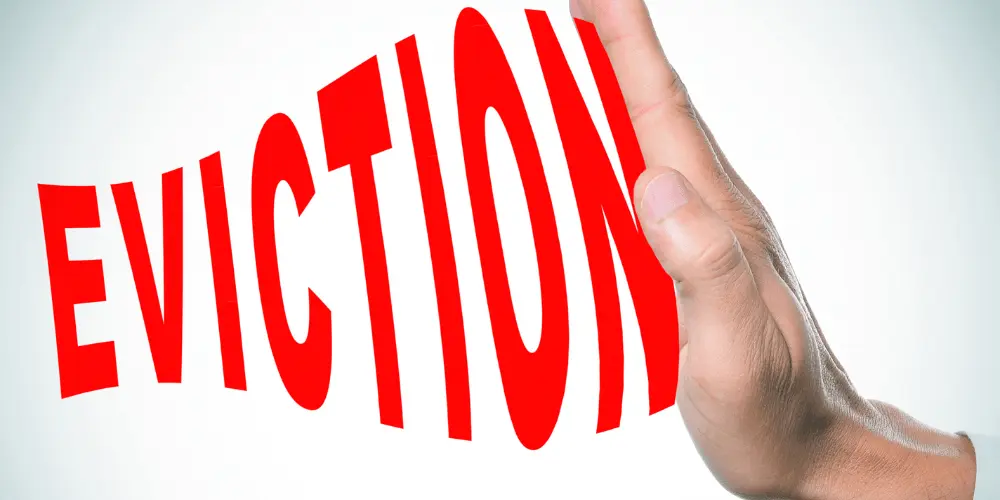
Facing the threat of eviction can be overwhelming. Renters across the country are struggling with rising housing costs, unpaid bills, and reduced income. When a household cannot pay rent, the risk of losing their home becomes very real. Acting quickly and knowing what resources exist can make the difference between keeping stable housing and becoming homeless.
This guide will explain eviction prevention strategies, how to access rental assistance, and where to find legal help. You will also learn important steps like communicating with landlords, preparing for a court date, and building a plan to avoid future housing instability.
If you are already behind, take time to review what to do if you’re behind on rent. Acting early is always the best step.
Eviction prevention refers to programs and actions designed to help renters stay in their homes. This can include financial assistance, legal support, and help paying utility bills. Local governments, nonprofit organizations, and housing counselors often provide these services.
Some families are at the highest risk of eviction. Households with low income, seniors on fixed incomes, and tenants who have missed several payments face the greatest danger. Single parents and families with limited savings are especially vulnerable. For many renters, even one missed payment can be enough to trigger the eviction process.
If you are worried about eviction, the CFPB offers guidance on what to do if you’re facing eviction.
Households at the highest risk are often juggling past-due balances on rent, utility bills, and transportation. Prioritize rent first to stop the legal timeline, then keep utilities from shutoff. Ask your landlord to apply for assistance on behalf of you if your local program allows it. Pair that with a short, written plan to catch up over the next 30–60 days. If your income is irregular, propose smaller weekly payments so you can show steady effort.
For immediate ideas, review Can’t Pay Rent This Month? Try These 5 Immediate Solutions and our guide to Emergency Rental Assistance Programs You Can Apply For Now.
The federal Emergency Rental Assistance Program (ERA Program) was created to keep renters in their homes during the COVID-19 pandemic. It provides help with back rent, utilities, and other housing expenses. Funds are distributed through state, local, and tribal governments, so the process may differ depending on where you live. Every program, however, has the same purpose: eviction prevention.
You can review details directly from the U.S. Treasury ERA Program.
Every ERA program is slightly different. A limited number of applications may be approved each month, so it is important to submit your paperwork early. Your ability to provide documentation and verification quickly will improve your chance of approval. Some programs are still implementing new funding rounds, so check your local government (gov) office website for updates.
Eligibility requirements usually depend on income and proof of hardship. Most programs are designed for eligible households earning less than the area median income. Applicants may need to show that they are unable to pay rent because of reduced income, increased expenses, or job loss.
Families with children, older adults, and those already experiencing homelessness are often given priority. Applicants must typically provide pay stubs, a lease agreement, or past utility bills to prove eligibility. Some programs may also set a maximum amount of emergency rental assistance funding per household, so confirm the rules before you apply.
Applications are managed by local housing departments or nonprofit offices. To apply, you usually need to:
Some programs also allow landlords to apply on behalf of tenants. Processing times vary, but keeping clear records and responding quickly helps move applications forward.
You can learn more about programs in your area at Emergency Rental Assistance Programs You Can Apply for Now.
The most common form of help is covering past-due rent. In many cases, payments go directly to the landlord to stop eviction proceedings. Some programs also cover future rental payments, giving households a chance to stabilize their budget.
Many ERA programs also pay for utility bills like water, gas, electricity, or internet. Some include other expenses related to housing, such as trash collection or late fees. Covering these costs can make it easier for tenants to stay current on rent.
In some cases, renters may also receive financial assistance with groceries, transportation, or access to an emergency shelter. Community programs and nonprofit organizations often provide this type of support.
To explore what is available in your area, visit 211.org housing and expenses help.

If you are struggling to pay rent while waiting for emergency rental assistance, talk with your landlord about short-term options. Some programs allow one-time rental payments or rental assistance funds to be applied directly to your account. If your state sets a maximum amount of aid, ask how much is still applicable to your household.
If you have already received emergency rental assistance, keep careful documentation. Save any records showing how much was paid, what bills were covered, and which expenses remain. This information may be requested later by landlords, courts, or government offices.
Emergency rental assistance is not permanent. As funds run out, households should create a plan for paying rent and utilities. Reviewing your budget, reducing non-essential expenses, and building a payment plan with your landlord can help prevent falling behind again.
Many cities and counties have their own eviction prevention assistance programs. These services might include short-term rental grants, mediation with landlords, or connections to legal help. Local governments often partner with nonprofit organizations to distribute funds or provide supportive services like food banks or transportation aid.
For renters searching for additional help, the HUD Eviction Protection Grant Program funds local organizations that provide direct eviction prevention support.
Some programs are designed specifically for families with children or older adults. These services may give priority to households in greater need and often include tenant education, budgeting support, and ongoing counseling.
For immediate ideas, read Can’t Pay Rent This Month? Try These 5 Immediate Solutions.
If you’ve received an eviction notice, contacting legal aid could make a big difference. Free or low-cost lawyers may explain your rights, review your paperwork, and even represent you in court. Acting quickly is key, as deadlines for responding are often short.
You can find local services through LawHelp.org’s rent and eviction help resources.
If your landlord files for eviction, you will be given a court date. Do not skip it; failing to appear makes it much harder to challenge the eviction. Bring your lease, payment records, utility bills, and any written communication with your landlord. This documentation can help prove your case.
To better understand the process, visit USA.gov’s guide to avoiding eviction.
If you cannot pay rent on time, reach out to your landlord as soon as possible. A clear subject line like “Request for Payment Arrangement” or “Rent Payment Plan Request” makes your email professional and shows your willingness to work together.
Many landlords prefer to work with tenants rather than start costly eviction proceedings. Be honest about your situation and propose a plan, such as partial payments or extra time to catch up. Showing good faith may convince your landlord to avoid court.
Email template you can copy:
Subject line: Request for Payment Arrangement – [Your Address / Unit #]
Hello [Landlord Name],
I am writing to let you know I cannot pay rent in full this month. I am applying for rental assistance through our local emergency rental assistance program (ERA program) and expect a decision soon. I can make a partial payment of $___ on [date] and the remainder by [date]. I will share documentation from the program when available.
Thank you for considering a short extension and a payment plan. I want to stay current and avoid court.
Sincerely,
[Your Name] | [Phone]
If you’re calling or leaving a voicemail:
“Hi, this is [Name] at [Address]. I am calling to request a short extension and a payment plan while I apply for emergency rental assistance. Please contact me at [number] so we can respond with a plan that works for both of us.”
Tip: if your landlord agrees to accept ERA funds on behalf of you, ask them to confirm that in writing.
“I am working with a counselor and applying to the emergency rental assistance program in our area. I have submitted my application and will provide verification as soon as the department requests it. While I wait, can we agree on a short plan so I can pay rent and avoid court? Thank you for working with me.”
Sometimes, eviction cannot be prevented. If that happens, look into emergency shelters or transitional housing programs in your area. These resources provide short-term safety and can connect you to long-term housing support.
You can start with USA.gov’s page on emergency help to pay rent.
You may also be able to stay with a family member or trusted friend while getting back on your feet. Community groups sometimes arrange temporary housing or connect renters to charitable programs that can help in a crisis.
If you need help, start with your local housing office, community action agency, or by dialing 211. These organizations can explain which programs you qualify for and how to apply.
The nationwide 211 housing expenses service is a great first step for connecting to local aid.
Many cities fund mediation and flexible services that solve small problems before they become big ones. These may include one-time utility credits, application fees for new housing, or moving help for families who must relocate. The HUD Eviction Protection Grant Program supports local partners delivering eviction prevention assistance. If you are unsure where to start, dial 211 or check your city’s housing website.
When you apply for rental assistance, complete every form fully and include all requested documents. Missing paperwork is one of the most common reasons applications are denied. Be prepared to answer follow-up questions quickly to avoid delays.
When completing applications, ask about coverage for expenses related to housing, including late fees, trash service, or security deposits. Some programs are not applicable to households in public housing, so confirm your eligibility before you apply.
Once you’ve made it through an eviction crisis, focus on staying current with rent and utility bills. Building a budget that prioritizes these essentials will help you avoid falling behind again. For more support, explore Credit.org’s free financial education guides.
Whenever possible, set aside savings to cover at least one month of rent. Even a small emergency fund can help bridge the gap when unexpected expenses come up. Over time, a financial cushion will give you peace of mind and reduce the risk of future eviction.
For step-by-step renters’ actions, the CFPB’s guide on what to do if you’re facing eviction is clear and practical.
If you have received emergency rental assistance, save every approval email, check stub, and landlord receipt. Keep a simple folder labeled “funds” or “services” with all expenses paid by ERA. Many residents are asked later to verify how funds were used. Bring this file to court if needed, and share it with your landlord to show good faith. If more help is available, ask your caseworker whether you can reapply for eviction prevention assistance while you work to stabilize your budget.
Eviction can feel overwhelming, but you are not alone. Programs exist to provide rental assistance, legal help, and housing support. Acting quickly, staying organized, and reaching out for help can make the difference between losing your home and keeping stable housing.
If you are worried about eviction or already facing the process, connect with a housing counselor right away. Credit.org offers Distressed Renter Counseling to guide you through your options, connect you with emergency rental assistance programs, and help you create a plan to protect your housing stability.